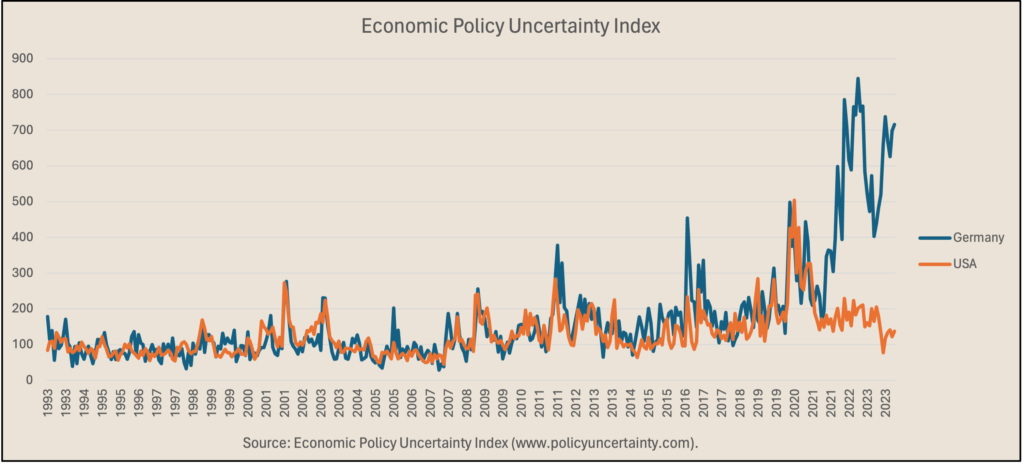NEW PARADIGM
Newsletter: What Germany Is Really Missing
From our Forum New Economy newsletter series.
BY
THOMAS FRICKEPUBLISHED
9. FEBRUARY 2024READING TIME
3 MIN
When it comes to diagnosing the state of Germany, it’s a bit like a bazaar at the moment. And every statement, no matter how absurd, seems to be justified – the main thing is to turn the findings of a country that is somehow in decline a little further. Really? Is Germany completely “no longer competitive” – when companies are still generating huge export surpluses? And does nobody really want to invest here anymore – when investments in the country have increased noticeably once again, as they did in 2023? And do we really have to make savings and cuts everywhere – when Germany has rock-solid public finances by international standards? Some of the findings seem to be more the result of lobbying and outdated economic policy reflexes than actually being true.
An index that attempts to register how often there is talk of uncertainty in the major media suggests what is actually (moderately) clouding the mood and situation in our country – although the results between the US and Germany have always run more or less in parallel in the past. Since 2021, the curves have diverged drastically: while perceived uncertainty is rampant in Germany, the phenomenon has subsided in the USA following the coronavirus shock.

Why is uncertainty rampant among Germans? It can’t be that there are more crises in the world per se. That would have an effect in both countries. Just like the uncertainty associated with the looming climate crises. Nor is it very likely that the often-cited bureaucracy in Germany has become such a differentiating factor since 2021.
It is more likely that the war in Ukraine is simply further away for the US – and that the consequences of the war, such as the drastic rise in gas prices in the meantime, are less damaging. This in turn explains some of the economic policy uncertainty, which in Germany is simply caused by the much greater challenge of a nearby war. The fact that the uncertainty index in the US has fallen so significantly again could also have something to do with the fact that US President Joe Biden has invested a lot of energy and money in the economy and subsidized a lot of it – and has not deviated from this.
Unlike the German government, which vacillates between major investment ambitions and efforts to reduce the national deficit – although, see above, there is no acute economic or financial reason to do so. Perhaps Germany would be in a much better position if the governing coalition could agree on where it wants to go.
*
In his latest book “Economics in America”, Nobel Prize winner Angus Deaton explains that established economists are occasionally wrong, even in the US. He argues that economics is a discipline that has focused on efficiency for too long and ignored social issues. We will be discussing this with Deaton at our next New Economy Short Cut – on February 20 from 5 pm. Christoph Schmidt, President of the RWI Institute in Essen, former head of the German Council of Economic Experts – and a former student of Deaton’s – will be commenting. Moderation: Heike Buchter (DIE ZEIT). Registration here.
This text is from our bi-weekly newsletter series. To subscribe, click here.
